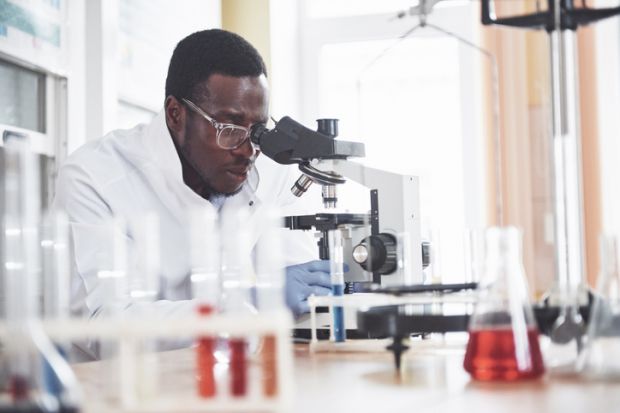The UK’s first academic conference for black cancer researchers is an important step towards improving chronically low numbers of ethnic minority scientists, its organisers say.
This week Cancer Research UK (CRUK) will host the inaugural Black in Cancer conference at the Science Museum in London, welcoming leading black cancer doctors, researchers and patient advocates from across the world, in what is believed to the first of its kind for a science conference in the UK.
“It’s definitely challenging the norm – I am usually the only black person in the room at the scientific conferences I attend,” explained Tanimola Martins, research fellow at the University of Exeter Medical School, and a board member of Black in Cancer, the grassroots group started by University of Cambridge PhD student Sigourney Bonner in 2020.
“For black cancer researchers, another big issue is that we never see any black scientists in leadership positions, so this is an opportunity to network with other black researchers but also meet those who have gone through a similar journey,” he added. “The vast majority of my collaborators I met at conferences like this so I think it’s important."
The event, which is taking place on 10 and 11 October, will also see the launch of Cancer Research UK’s first PhD scholarship exclusively for black students, part of efforts to diversify its pool of researchers. Only 1 per cent of applicants to its research schemes are black, says CRUK, which spends almost £500 million a year on research – slightly lower than the UK biosciences average of 2 per cent, while success rates for applications were also lower (13 per cent compared to 24 per cent for those from a white background).
“When we looked at our researchers, we realised we only had one senior programme grant holder who was black, so there is a massive dearth,” explained Iain Foulkes, the funder’s executive director for research.
While CRUK already anonymised applications to reduce bias, the organisation needed to take a more radical approach because it was not receiving enough applications from black cancer researchers, Dr Foulkes continued. “At undergraduate level there is a pretty good representation but it drops off hugely for postgraduate and then doctoral study,” he explained, adding that a “more systemic view” was needed to increase PhD study among black students.
Supporting the Black in Cancer conference and increasing the number of black researchers was an important part of that, particularly if it helped engage the black community more widely on health issues, said Dr Foulkes, who added that the event would also welcome non-black scientists focused on cancers that disproportionately affected ethnic minority communities.
“If you look at the breast cancer movement in the 1970s with the involvement of Betty Ford, [who spoke out as First Lady about her cancer treatment] you can see what a massive impact when women came together and spoke about these issues,” he said.
“Back then, cancer was a very male-dominated culture but there is very strong evidence that if communities of interest come together in this way, it will have very strong results,” he added.
“There is an enormous mistrust within the black community about some areas of medicine,” added Dr Martins. “When you see those behind the science – and see they are also black – that can really help,” he added.
The event is aiming to capture some of the success of the Black in X movement in the US, in which hundreds of grassroots, mainly online groups such as Black in Chemistry, Black in Neuro and Black Botanists were founded shortly after the murder of George Floyd in May 2020, which have helped bring visibility to black scholars in their field.
“The American situation was more urgent given the history of discrimination and violence,” reflects Dr Martins. “In the UK, things are more subtle so we won’t have the same type of campaign but we still cannot ignore the disparities that exist,” he said.
Register to continue
Why register?
- Registration is free and only takes a moment
- Once registered, you can read 3 articles a month
- Sign up for our newsletter
Subscribe
Or subscribe for unlimited access to:
- Unlimited access to news, views, insights & reviews
- Digital editions
- Digital access to THE’s university and college rankings analysis
Already registered or a current subscriber? Login








